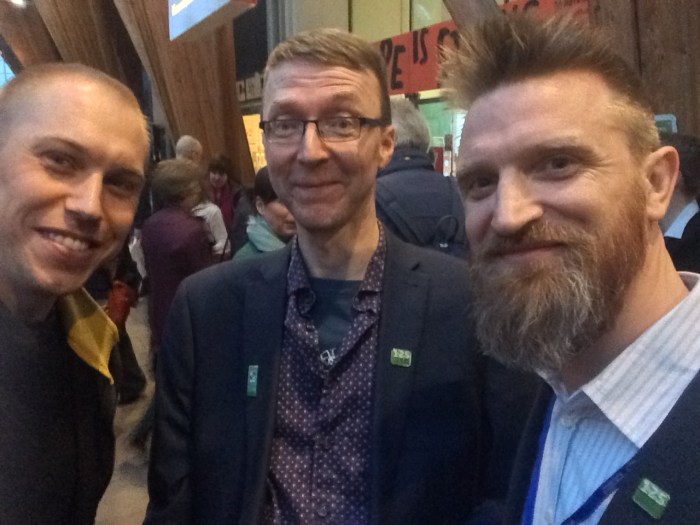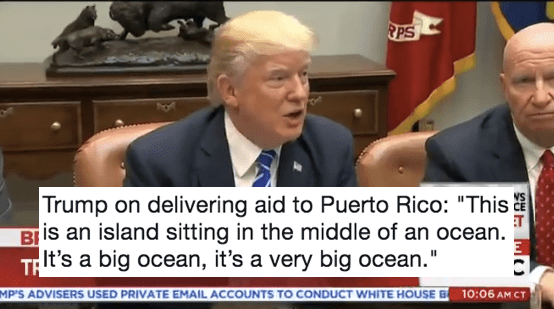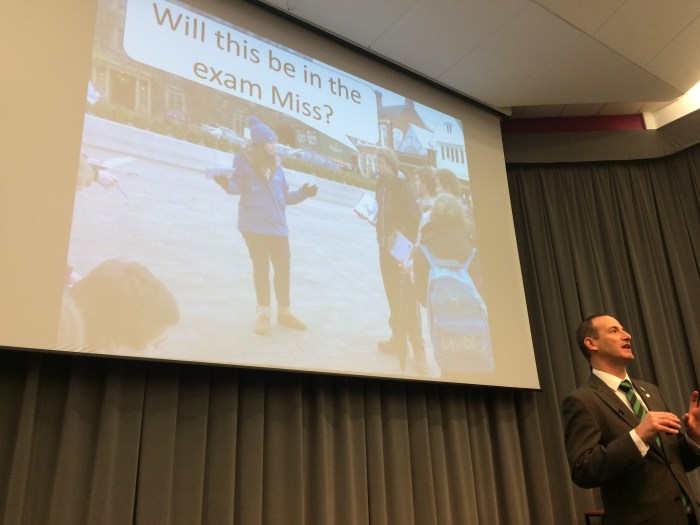This weekend I bounced up to Sheffield for a conference. I’m sitting on the train heading back to East Anglia just gathering my thoughts and notes. I purposely arranged the UK part of my sabbatical to coincide with the Geographical Association national conference – it’s certainly an event that’s worth the effort to attend, in my experience. Apparently, this annual conference is the biggest one of its kind in the UK! That’s not hard to believe to be fair.
 As always, the conference kicks off with a public lecture on the Thursday night. The event is one of some prestige, there have been a number of high-profile speakers in the past such as Hans Rosling (2011) and Peter Gibbs (2017). But I like that it’s not always exclusively ‘household names’ that get to speak at the opening lecture. Admittedly, I hadn’t heard of Dan Raven-Ellison (@DanRavenEllison) until Thursday, but he certainly has been having an impact with his work, deserving centre-stage and opening the conference.
As always, the conference kicks off with a public lecture on the Thursday night. The event is one of some prestige, there have been a number of high-profile speakers in the past such as Hans Rosling (2011) and Peter Gibbs (2017). But I like that it’s not always exclusively ‘household names’ that get to speak at the opening lecture. Admittedly, I hadn’t heard of Dan Raven-Ellison (@DanRavenEllison) until Thursday, but he certainly has been having an impact with his work, deserving centre-stage and opening the conference.
Dan is a true ‘geography activist’, although he argues that a lot of people are, especially Geography teachers. His lecture, “Guerrilla Geography” certainly took that to another level…

Dan first demonstrated to us that Geography can be in the eye-of-the-beholder. Take Google Maps, for instance. This widely-used product will give you different displays in different countries. Perhaps to avoid being the centre of an international dispute? Catering to the audience? And how about a map of Facebook connections? China’s pretty dark on that… Geography is different for different people.


So to engage in ‘guerrilla geography’, and get connected to your geography and the geography of others, Dan suggests a process to go though.
- Have a mission
Analogous to guerrilla warfare, perhaps, is to have a mission objective. What are you trying to discover/demonstrate/prove/disprove etc? Although Dan didn’t state himself, to me it helps to be intensely focused on that goal. At least, that’s the way I tend to work and get motivated! Dan showed us footage of a semi-serious, semi-comical experiment to make CCTV more overt and gauge people’s reactions. Everywhere where CCTV cameras went, a team walked around following people with mocked-up CCTV cameras on their shoulders. The rule was they could only do this in sight of a real CCTV camera. A very clever method making the ever-present inconspicuous monitoring, conspicuous.
- Take action
The CCTV mission is also an example of action, and to take something out of spatial context to see what the results are. Dan’s next example was taking George W Bush’s claim that ‘torture’ is ok and take it ‘out of spatial context’. If it’s ok hidden away at Guantanamo Bay, then what if we did out on the lawn outside the US Embassy in London? Rather than it being a thought experiment, they did it…
For Dan, ‘guerrilla geographers’ have a ‘suite’ of tools, rather than say, a ‘guerrilla gardener’ given that our subject is so wide ranging, complex and interdisciplinary. And I think us geographers do like a bit of ‘one-upmanship’ over others, as underappreciated as we feel! 😉
“How far can we pull to levers of activism [as geographers]?”
- Exploration
I almost let out a cheer when this one came up. Indeed, it’s what I’ve been doing this academic year for myself, and seeing it action on a community level at the Exploratorium. While I’ve always been in agreement that geographers should be on the front-foot in getting out and about so they can put context and experience into their teaching, I’m now a vehement believer that that should be the case. I’d even go so far as say geography teachers should be actively encouraged to do so by their employers. And exploration doesn’t have to be complex, ambitious or expensive.

One of Dan’s projects in this vain was the Urban Earth Project, walking across some of the world’s biggest cities taking a photo every 8 steps. Something you should certainly check out.
Here is Mumbai:
#WildCities
“Where there is or isn’t a public toilet can change the geography of where people can go.”
There is plenty of recognition, not just from geographers, that ‘urban’ is a type of habitat. With that in mind, why doesn’t the UK have a city as a national park? Dan strongly feels that London should be a prime candidate and has hence a mission for ‘guerrilla geography’ has ensued.
“People are animals who live in an urban habitat, and deserve just as much of a clean and pristine environment as an animal in a more remote place”
After-all, London is actually the ‘greenest’ city in the world by area. Over half of London is green space (both open and domestic), and 2.5% blue space (water).

There are more breeding pairs of peregrine falcons in London than there are in the Peak District, or Yosemite National Park in California.
But Dan threw us some coincidental statistics that really were surprising, and to me, a ‘call to arms’. 1 in 7 children in London have not been to a green space over the last year, and, 1 in 7 species in the UK are at risk of extinction. While not correlated, these are two coincidental statistics that can be addressed together by encouraging the growth, use and protection of green spaces in the city.
So how to go about this through ‘guerrilla geography’? Well, set up a fake website about the ‘Greater London National Park’ and put up entry signs and footpath way-markers.
Now the idea to give London ‘national park’ status was proposed to the government, but they were rebuked because London doesn’t “fit the criteria” to be a national park. But a collaboration with Queen Mary University in London and local politicians showed that actually, you can take at least one photograph in each of London’s 33 boroughs, which provides you with more than enough visual evidence to say that it does.
Dan has headed the #BigWalkAroundLondon and #NationalParkCity campaigns, got architects to join in to do concept art of greening up parts of the city further and now, Dan announced that London may indeed become the first ever ‘National Park City’ in 2019!
A final message Dan gave to promote ‘guerrilla geography’ was that the while data exists, the Government are not ‘democratising’ this data in a way that can allow people to do things for themselves, like flood proofing or community development projects. So taking action from the bottom-up to grab control of information through a mission, action and exploration is a way to counter this.

The President… is a geographer!
Also customary to kick off the conference is the Presidential Lecture, on the Friday morning. The GA President for 2017-18 is Nick Lapthorn. While I’ve known Nick for a long time, it’s mostly been through liaising during CPD events like this, but his personality makes you feel like you’ve known him more than just a geography acquaintance. Natural banter, ease of conversation, passionate, personable. So I was delighted to hear last year that he would be taking up the mantle of President.

Nick chose the theme of “Real World Geography” for this year’s conference. It’s a clever theme. Geography should be about the real world, after all, but in these times of performance-driven teaching etc, it’s almost as if we just need to be reminded that. Or at the very least ensure we continue to ensure that Geography in schools stays true to what really should be about: the real world.
After giving us all a chuckle about his old A-Level Geography reports, Nick concludes his opening by stating that really he is an ‘accidental geographer’. He suggested that a lot of people are but we/they seem to get unrecognised as ‘geographers’ because we/they are so diverse. Michael Palin, a head figure for the Royal Geography Society, for example, is a Historian. So Nick suggested that the ‘GA’ should be not ‘Geography Association’, but ‘Geographers Anonymous’. Anyone ready to confess? 😉 Even Donald Trump is a geographer (whether he knows/likes it or not)!

And… what do you call two geographers in a boat? The answer: Pinsent and Cracknell! (It wasn’t a joke, although Nick deliberately had us hanging for a punchline). Think of all the things that two Olympic rowers need to consider to become a success in their sport that is geography related.
“Geography isn’t about going further, but seeing deeper.”
You don’t need to go the other side of the world to see geography, and it’s a disservice to young people if we just teach them methods, exam technique, models etc rather than the bigger picture. Hitting home for a lot of us, Nick told the story of a some really engaging geography being taught, and a youngster puts his hand up and asks: “Will this be in the exam, Miss?”, and often, what happens, if the answer is ‘no’, then engagement turns off and the student puts their pen down. That is both heart-breaking and perverse.

Nick finishes his lecture with giving us all membership to the ‘geography club’. There is no exclusivity about it, you just need to admit that you are a geographer. (We were glad that he had a quote from Obama in antidote to an earlier significant personality!)
Both lectures got me fired up for the rest of the weekend. I’ll be summarising my highlights from Friday and Saturday, and doing separate blog entries for one or two things that really hit home for me. Watch this space for that. But also I strongly suggest you check out the #GAConf18 hashtag on Twitter, because 100s of people took part in the conference and there were so many wonderful things going on that attendees tweeted about. So if you didn’t get to go (or did but, as you know, can’t get to everything) have a scroll through and you’ll stumble across some interesting stuff!
Although I miss my experiences in the States dearly… it’s good to be amongst the crazy (geography) gang again!
More soon…
P.S. My sabbatical is self-funded and un-paid. Please check out my paid resources at TES and Teachers-Pay-Teachers! If you are looking for teaching resources for all subjects, not just Geography, please check out ZigZag education’s catalogue by clicking through my affiliate link here. If you do find something useful and purchase, I’ll get some commission to help me pay for a public transport fare etc! 😉 I also have free resources on my portfolio page, and you can check out an index of which of my blog entries match which parts the various UK GCSE Geography syllabuses!


3 thoughts on “Geography Activists (GAConf18 Review Pt.1)”